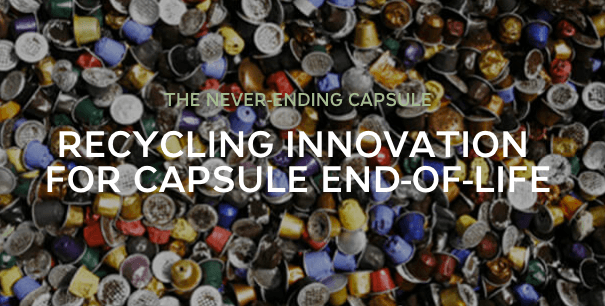
It is hard to think of a product more useless, and with a larger environmental impact, than bottled water — although those single-use coffee pods come pretty close. Largely popularized because of the longstanding partnership between Keurig and Green Mountain Roasters, coffee pods have surged in popularity over the past decade because of their convenience. Just about every coffee brand has a line of machines and pods, including a Starbucks machine that was hilariously parodied by Saturday Night Live.
But coffee pods pose their share of recycling challenges. Sure, you can scoop out those coffee grinds for your garden, wash out the aluminum or resin-based pods, and recycle the components. But most consumers will laugh if you suggest such an idea. In Canada, Office Max and TerraCycle launched an in-store pilot recycling project for coffee pods, and even expanded the program, but that effort is a drop in the bucket as the vast majority of pods go into landfills.
Now Nespresso, a successful coffee pod maker (and coffee disks, just to be clear) due in part to having George Clooney has a spokesman, says it is increasing its waste-diversion and recycling efforts here in the U.S.
In a widely disseminated press release, Nespresso announced it has expanded a pilot coffee-pod recycling program from 20 states to the contiguous 48 states of the U.S. In a partnership with UPS, Nespresso users can plonk their used aluminum pods into a pre-paid UPS bag, drop them off at just about any UPS pick-up location (or a local Office Depot or Staples) or have your local courier pick them up at your doorstep, and UPS will send them to one of Nespresso’s partner recycling facilities.
No word yet on what incentives will be offered to consumers that bother to ship their used coffee pods. Currently, once delivered to a recycling center, the capsules are shredded and the various materials are separated. Any coffee grounds are sifted and shipped to an industrial composting plant.
In theory, Nespresso diverts the new raw materials to companies such as TerraCycle, which either upcycle the material or churn it into new products. Participants in the program can accrue points, which can then be converted into donations for local nonprofits or schools. But the program with TerraCycle has tapped out in Canada — the company is no longer accepting new participants, and it has requested that consumers who want to rid themselves of those pods find other ways in which to recycle them.
In an email to TriplePundit, a Nespresso spokesperson described the expanded recycling effort as “the latest development in Nespresso’s sustainability strategy, in which they have prioritized recycling and creating a sustainable value chain.”
Clearly Nestlé, Nespresso’s parent company, touts such a program as part of the company’s “shared value” mission. But the reality is that if something cannot go into the blue bin, most likely that item is not going to be recycled, even if it can be picked up and shipped for free. In the case of these Nespresso pods, shared value it is Nestlé -- and the consultancies advising the company on such strategies -- the score the financial benefits, while municipalities pick up the tab for hauling and landfilling the waste.
As one TriplePundit commentator recently pointed out, Nestlé is actually in the position to use more responsible and sustainable (as in: recycled) materials. But instead, the company designed these pods and machines for maximum commercial gain — and expects a few textbooks or some donated play equipment to balance out any environmental impact. Meanwhile, Nespresso will point to other projects, such as working with farmers in South Sudan, as showing that its “EcoLaboration” works.
Not everyone is buying into Nespresso’s communications plans. The city of Hamburg, Germany, banned the use of those single-use coffee pods in government buildings earlier this year, the BBC reported. Do not be surprised as more municipalities, in trying to set an example for their citizens with it comes to sustainable behavior, follow the lead of Germany’s second largest city.
Image credit: Nespresso

Leon Kaye has written for 3p since 2010 and become executive editor in 2018. His previous work includes writing for the Guardian as well as other online and print publications. In addition, he's worked in sales executive roles within technology and financial research companies, as well as for a public relations firm, for which he consulted with one of the globe’s leading sustainability initiatives. Currently living in Central California, he’s traveled to 70-plus countries and has lived and worked in South Korea, the United Arab Emirates and Uruguay.
Leon’s an alum of Fresno State, the University of Maryland, Baltimore County and the University of Southern California's Marshall Business School. He enjoys traveling abroad as well as exploring California’s Central Coast and the Sierra Nevadas.














